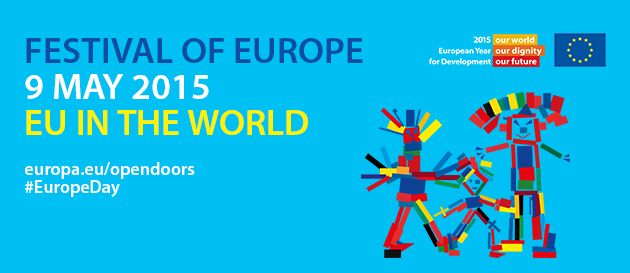Europe Day 9 May 2015 – Building Europe together – Promoting human rights
Every year on May 9, the European Union celebrates Europe Day, remembering French foreign minister Robert Schuman’s 1950 “Schuman Declaration”, which became a cornerstone of the European Community. Even today, 65 years later, statements from this Declaration well exemplify the step-by-step process of European integration:
“Europe will not be made all at once, or according to a single plan. It will be built through concrete achievements which first create a de facto solidarity.” (European Union: The Schuman Declaration)
Concrete achievements and joint action can also be seen in the EU enlargement policy, which aims at the rapprochement of new member states and candidate countries to European norms and standards. With financial support from the European Commission, the EU member states support the enlargement countries in their reform processes through a variety of projects. Austria, celebrating the 20th anniversary of its EU accession this year, focuses on the co-operation of both state and non-state actors with the countries of the Western Balkans, which is to be even further intensified in the coming years. Contributing to this, the Western Balkan Summit, taking place in Vienna in August 2015, will further advance the agenda of the “Berlin process”, launched last year to promote the rapprochement of the Balkan countries towards the EU.
Over the last two decades, the EU enlargement policy gave more and more priority to rule of law and human rights issues in the pre-accession process. Reforms in legislation and practice, e.g. with regard to ensuring fair trials, press freedom and freedom of speech, or minority rights, are of central importance to the current enlargement countries – not only for the launch, progress and conclusion of accession negotiations, but also in terms of awarded EU financial assistance. A key instrument here are Twinning projects, which are partnerships between institutions of EU member states and of enlargement countries, taking concrete measures to implement EU legislation or to strengthen rule of law through institution-building.
In 2002, the European Commission mandated the Ludwig Boltzmann Institute of Human Rights (BIM) to carry out Twinning projects on behalf of Austria. Since then, the BIM has participated in 26 pertinent projects in 15 countries. Guided by a vision of active, practice-oriented research, the Institute applies its scientific know-how for policy advice on EU legislation and good practices in the fields of human rights, rule of law and good governance. In implementing project activities, it is essential for BIM as a human rights institute to apply a partnership approach, based on dialogue and mutual learning.
This year’s Europe Day allows the BIM to also celebrate the start of two new Twinning projects: in co-operation with the Austrian Ombudsman Board and the Macedonian Ombudsman Office a new project on the prevention of torture and anti-discrimination as well as institutional capacity building for the Ombudsman Office will be launched in mid-May. Anti-discrimination as well as human and minority rights in general will also be the focus of a project which will start in June in partnership with the Serbian Office for Human and Minority Rights, the Serbian Commissioner for Protection of Equality and the Slovenian Office for National Minorities. The BIM looks forward to these co-operations and the opportunity to contribute with is expertise, to support reform processes and to strengthen human rights structures in Macedonia and Serbia.
Yet, human rights and compliance with them do not only concern those states striving for EU membership or other countries the EU is engaged with in foreign policy relations. A consistent and credible EU human rights policy must also include the internal dimension to prevent being accused of applying double standards towards EU member states on the one hand and third countries on the other hand (see also the results so far elaborated under the research project FRAME). A lack of coherence can be found in a couple of fields, first and foremost in the treatment of asylum seekers and refugees within the EU and along its borders. In view of the daily horrible news from the Mediterranean Sea, this year’s Europe Day precisely provides an opportunity to reflect on the failed asylum and migration policy of the EU member states and to remember Schuman’s idea of de facto solidarity.
More information:
Susanne Fraczek, fhfnaar.senpmrx@havivr.np.ng
